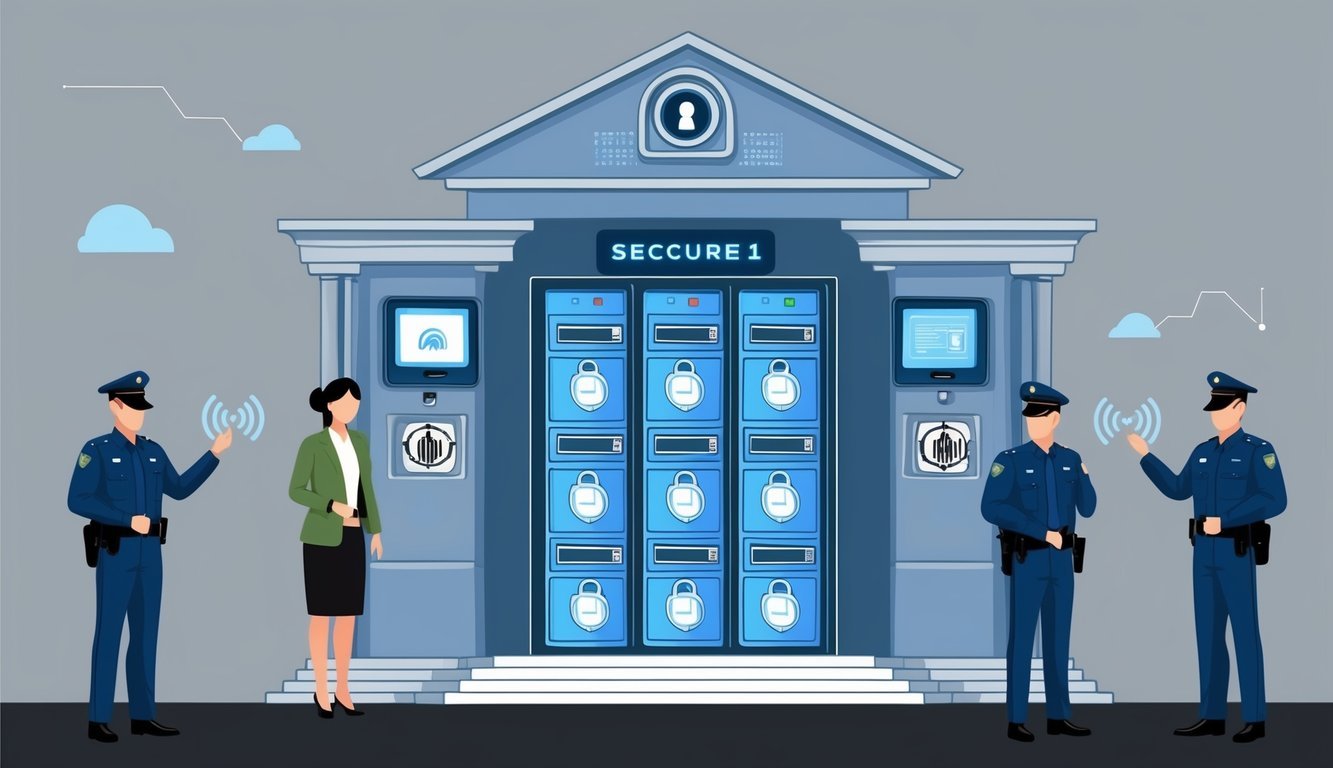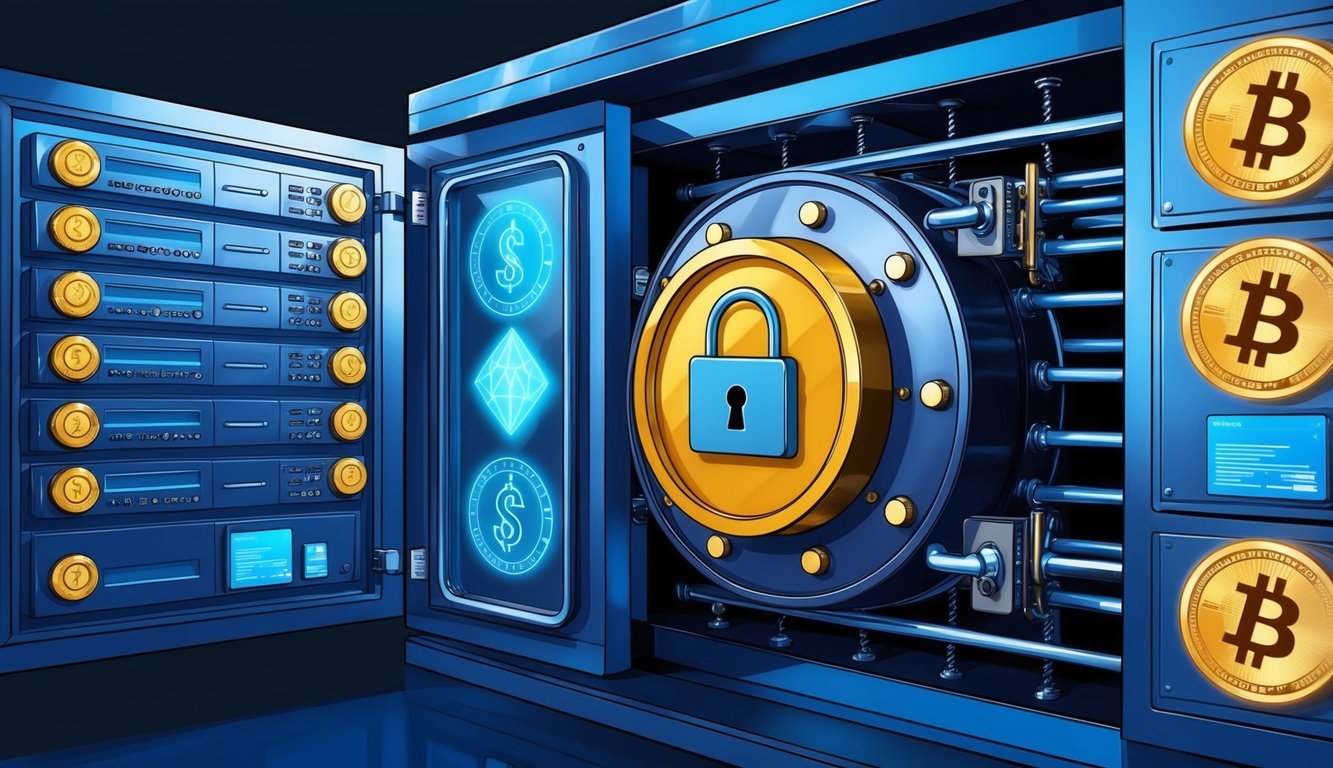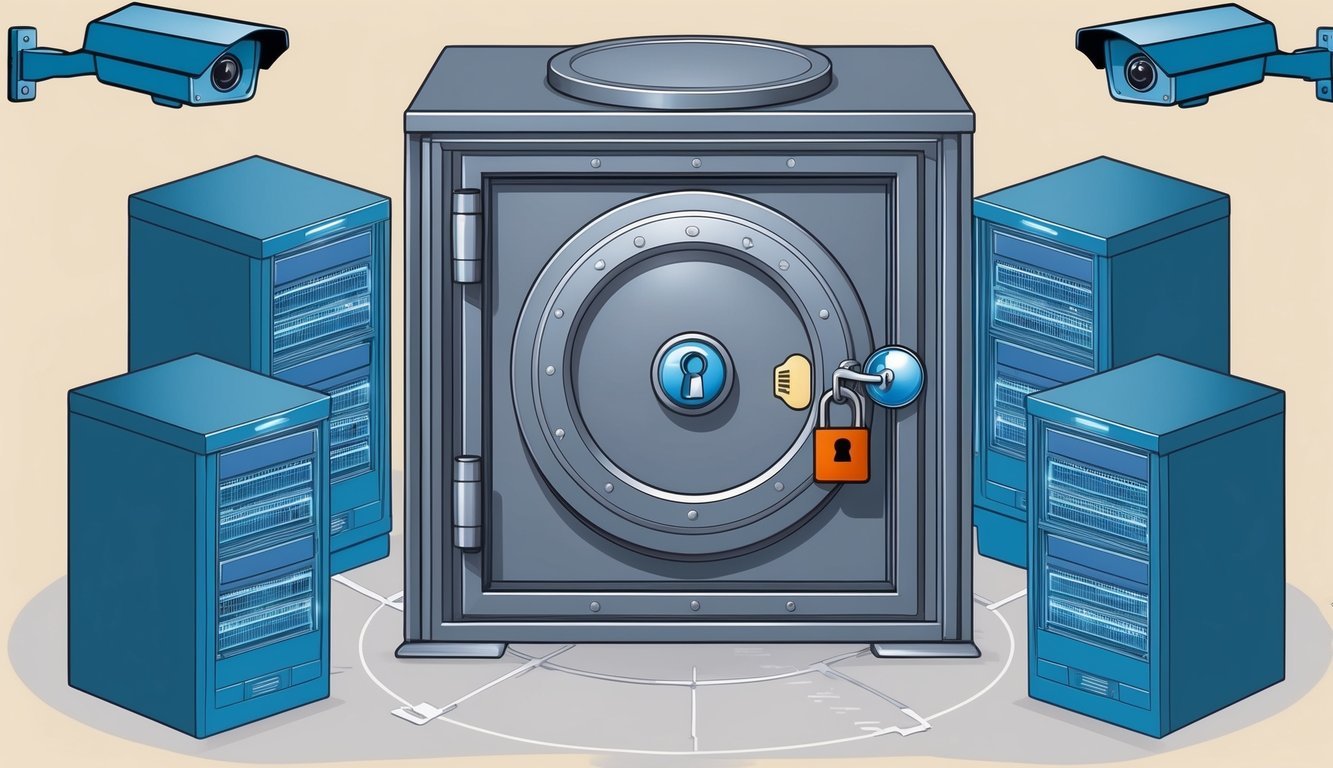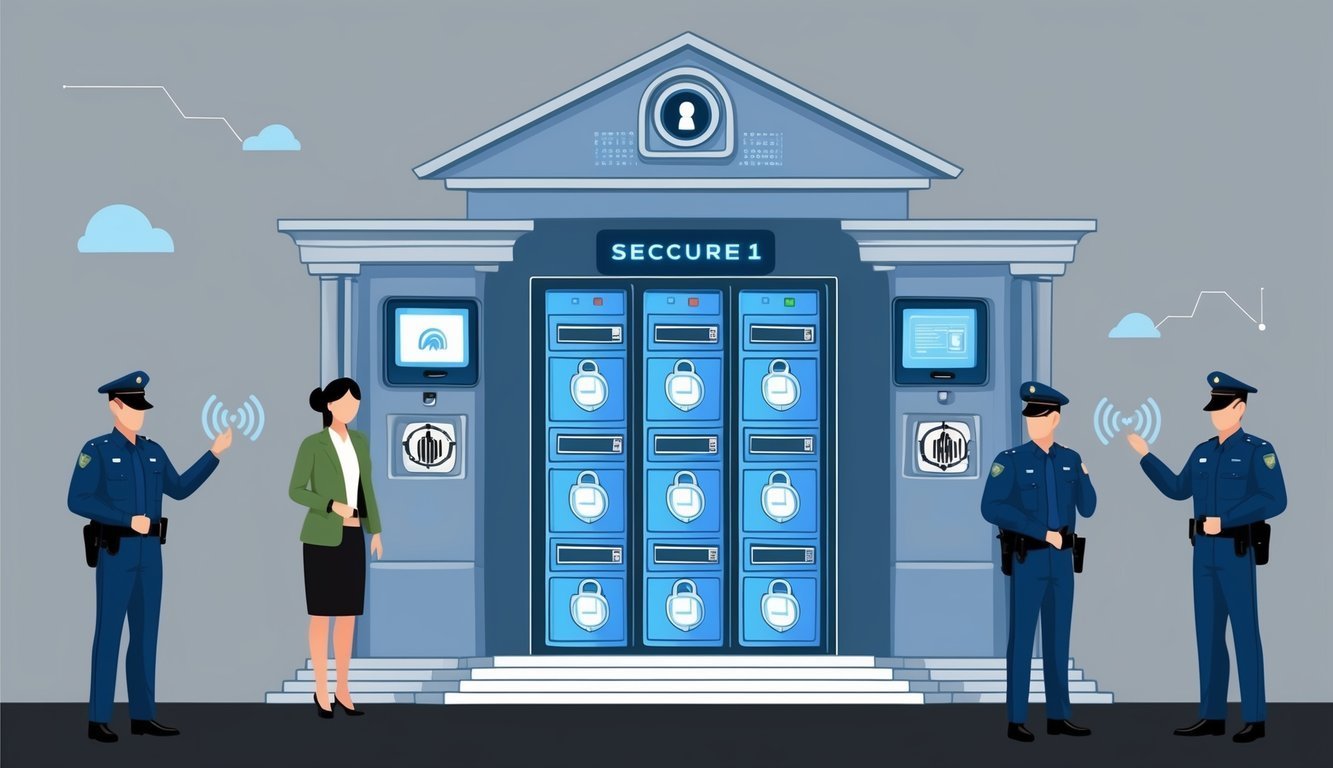Crypto can be confusing, right? You might have heard about crypto custodians but aren’t sure what they do. Don’t worry, we’ve got you covered.

A crypto custodian is like a super-safe digital bank for your cryptocurrency. These organizations keep your digital coins secure, so you don’t have to worry about losing them or having them stolen. They use special technology to guard your crypto and make sure only you can access it.
When you buy crypto, you need a place to store it. That’s where custodians come in. They offer digital wallets to hold your coins and use fancy security measures to protect them. It’s like having a personal bodyguard for your digital money.
Key Takeaways
- Crypto custodians keep your digital coins safe from theft and loss
- You can choose between different types of custodians based on your needs
- Picking a trustworthy custodian is key for protecting your cryptocurrency
Understanding Crypto Custodians
Crypto custodians play a big role in keeping digital money safe. They offer a way to store crypto that’s different from doing it yourself. Let’s look at what they are and how they compare to managing your own crypto.
Defining Crypto Custody
Crypto custody means storing and protecting digital assets like Bitcoin. A crypto custodian is a company that keeps your crypto safe for you. They use special tech to guard your private keys, which are like passwords for your crypto.
Custodians often work with big investors or companies. They offer extra safety features that you might not have at home. These can include:
- Cold storage (keeping crypto offline)
- Insurance for your assets
- Regular security checks
Crypto Custodian vs. Self-Custody
Self-custody means you keep your own private keys. It’s like being your own bank. You have full control, but you’re also fully responsible for safety.
Using a custodian is different:
- They handle security for you
- You don’t need to worry about losing your keys
- They often have better protection against hacks
But there are trade-offs:
- You trust someone else with your crypto
- You might pay fees for the service
- You can’t always access your crypto instantly
Choosing between the two depends on how much crypto you have and how comfortable you are managing it yourself.
The Role of Crypto Custodians in Asset Security

Crypto custodians play a key part in keeping digital assets safe. They use strong security and follow rules to protect your crypto.
Secure Storage Solutions
Crypto custodians use cold storage to keep most of your assets offline. This makes them very hard to steal. Cold storage often means special hardware wallets or paper backups in secure vaults.
They also use hot storage for some assets. This lets you trade quickly, but it’s riskier. Good custodians keep only a small amount in hot storage.
Some use multi-signature wallets too. These need more than one person to approve moves. It’s like having multiple locks on a safe.
Security Protocols and Measures
Custodians use lots of security steps to protect your crypto. They might use two-factor authentication (2FA) when you log in. This means you need your password plus a code from your phone.
Many use encryption to scramble data. Even if someone got in, they couldn’t read it. Some also use air-gapped computers. These aren’t connected to the internet, so hackers can’t reach them.
Regular security checks are common too. Experts look for weak spots and fix them fast.
Insurance and Compliance
Good custodians have insurance. If something goes wrong, you can get your money back. The amount covered varies, so check the details.
They also follow rules and laws. This is called regulatory compliance. It means they meet government standards for keeping assets safe.
Custodians often get audited. Outside experts check their books and systems. This helps make sure they’re doing things right.
Some custodians work with big companies. These firms often need extra security and legal protection for their crypto.
How Crypto Custodians Work
Crypto custodians use advanced security methods to protect your digital assets. They handle transactions and storage carefully, using multiple layers of protection to keep your crypto safe.
Transaction and Storage Processes
Crypto custodians manage your digital assets like a bank handles cash. When you want to make a transaction, you tell the custodian what to do. They check it’s really you asking, then carry out the transfer.
For storage, custodians use a mix of hot and cold wallets. Hot wallets are connected to the internet for quick trades. Cold wallets are offline, giving extra security for assets you’re not using right away.
Your crypto is tied to public and private keys. The custodian keeps these safe, especially the private keys. They’re like the password to your crypto, so they need serious protection.
Multi-Signature and Two-Factor Authentication
Multi-signature protocols add an extra layer of security. It’s like needing two or more keys to open a safe. Several people might need to approve a transaction before it goes through.
Two-factor authentication (2FA) is another security must-have. When you log in or make a transaction, you’ll need to prove it’s you in two different ways. This could be:
- Something you know (like a password)
- Something you have (like your phone)
- Something you are (like your fingerprint)
This makes it much harder for hackers to get into your account. Even if they guess your password, they’d still need your phone or fingerprint to get in.
Choosing a Reliable Crypto Custodian
Picking the right crypto custodian is key for keeping your digital assets safe. You’ll want to look at features, security, and fees when making your choice.
Custodial Features and Services
When selecting a crypto custodian, check out what they offer. Do they support the coins you have? Can you trade easily? Look for features like:
- Multi-signature wallets
- Insurance coverage
- 24/7 customer support
- Easy withdrawals and deposits
Big players like Coinbase Custody and Gemini Custody often have robust offerings. They might give you fancy tools for trading or managing your assets.
Think about what you need. If you’re a big investor, you might want more advanced stuff. But if you’re just starting, basic features could be enough.
Assessing Transparency and Security
Security is super important when it comes to crypto custodians. You want your coins safe, right? Look for custodians that are open about their security measures.
Good custodians will tell you about:
- Their cold storage methods
- How they protect against hacks
- Their backup plans
Check if they use things like role-based governance. This means different people have different levels of access to funds.
Ask about their security protocols. Do they use multi-factor authentication? How often do they audit their systems?
Remember, a trustworthy custodian won’t mind answering your questions. If they’re dodgy about security, that’s a red flag.
Evaluating Custody Fees and Services
Fees can eat into your crypto gains, so pay attention to them. Different custodians charge in different ways. Some have flat fees, while others take a percentage.
Here’s what to look out for:
- Storage fees
- Transaction fees
- Withdrawal fees
Compare the fees of a few custodians. But don’t just go for the cheapest option. Sometimes, paying a bit more gets you better service or security.
Think about the services you get for the price. Does the custodian offer extras like tax reporting or market analysis? These might be worth paying for if you need them.
Ask about any hidden fees too. You don’t want surprises later on. A good custodian will be upfront about all their costs.
Frequently Asked Questions

Crypto custodians play a big role in keeping digital money safe. Let’s look at some common questions about how they work and why people use them.
How do crypto custodians keep assets secure?
Crypto custodians use special security tricks to protect your coins. They keep most of the money in cold storage, which means it’s offline and hard for hackers to reach.
Many also use things like two-factor login to make sure only you can get to your account. This means you might need to enter a code from your phone along with your password.
What kind of jobs are there in crypto custody?
Crypto custody companies need people with different skills. You might find jobs in tech, like coding the systems that keep coins safe.
There are also roles in customer service, helping users with their accounts. Some jobs focus on following the rules and keeping the company legal.
Which companies are at the top when it comes to crypto custody?
Some big names in crypto custody are Coinbase Custody and BitGo. These companies take care of lots of digital money for big investors.
Other well-known custodians include Fidelity Digital Assets and Gemini Custody. They’re trusted by many people to keep their crypto safe.
What’s the difference between holding my own crypto versus using a custodian?
When you hold your own crypto, you’re in charge of keeping your keys safe. It’s like being your own bank. You have full control, but it’s all on you if something goes wrong.
Using a custodian means letting someone else take care of your crypto. They handle the safety part, which can be easier. But you’re trusting them with your money.
Can individuals also use crypto custody services, or is it just for big players?
Crypto custody isn’t just for big companies. You can use these services too if you want extra safety for your coins.
Some custodians focus on helping regular people, not just big investors. It can be a good choice if you have a lot of crypto or don’t want to worry about keeping it safe yourself. These custodians often provide additional services, such as secure storage solutions and insurance, ensuring that your digital assets are protected from theft or loss. For those who are new to cryptocurrency trading, understanding tools like stoploss orders can also be essential; stoploss orders explained for beginners can help you manage risks effectively and prevent significant losses. By choosing a custodian, you can focus on your investment strategy while knowing that your assets are in trustworthy hands.
What rules and regulations do crypto custodians have to follow?
Crypto custodians have to follow rules to keep your money safe. In many places, they need special licenses to hold onto other people’s crypto.
They also have to check who their customers are and report big trades. This helps stop crime and keeps the system fair for everyone.





